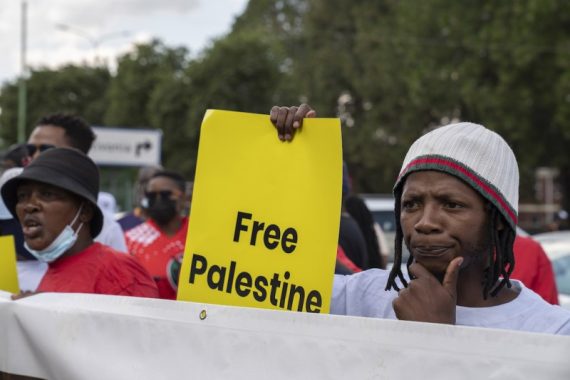T
he Israeli-Palestinian conflict has polarized Africa. The earlier reflection of this was seen in Israel’s attempt to join the African Union. It has become clear that African countries that have cordial relations with Western countries side with Israel on Gaza. The Middle East and Gaza in particular has divided African nations one more time.
The Palestinian cause, whose origin dates back to 1917, remains important in the global system today. Israel’s occupation of Palestine, which began in 1948, is important not only for the Middle East, but also for countries struggling against colonialism, such as numerous countries in Africa. Israel’s inhumane practices in Palestine, i.e., apartheid, displacement, injustice, and disregard for human rights, are practices that African countries have also been subjected to and have similar intersections with many of the practices of colonial forces in Africa in the past, such as capitalism and dispossession.
Israel’s occupation of Palestine based on strategies similar to those that underpinned colonialism and apartheid in Africa has survived despite 75 years of criticism and reactions. In fact, Israel’s unfair land acquisition/usurpation of Palestinian lands, the blockade in Gaza, the apartheid wall in the West Bank, the failure to treat the real owners of the land as human beings, its discriminatory policies, and practices in place stopping the Palestinian people from practicing their culture and beliefs as they wish are all part of Africa’s dark legacy. It all feels like a familiar memory. These difficulties are an important factor in the Palestinian people empathizing with the injuries and inequalities experienced during the colonial period, on the one side, and in the peoples of Africa supporting the Palestinians’ struggle for freedom, on the other.
This intersectionality is emphasized in the statement by Nelson Mandela, the former president of South Africa, who said, “Our freedom will be incomplete without the freedom of the Palestinian people.” The fact that South Africa’s support for Palestine has attracted the most attention in Africa is a reflection of a sensitivity towards the apartheid system. While this is an example of solidarity extending from one continent to another, it is also a strong message that emphasizes support for societies that share similar difficulties, evils, and injustices.
The African Union’s position
Africa’s solidarity with Palestine is based on Palestine’s solidarity with Africa. Historically, the Palestinians see their struggle for liberation in the context of the struggles of most African countries against Western colonialism. Resolution 77 (XII) adopted by the African Union in 1975 states, “The racist regime in occupied Palestine and the racist regimes in Zimbabwe and South Africa have common imperialist origins, form a whole and have the same racist structure and policies aimed at the suppression of human dignity and integrity.”
The African Union has taken decisions on Palestine that are fundamentally supportive of its independence and sovereignty, and aim at ensuring a just and lasting peace between the two countries. The African Union supports the two-state solution to the Israeli-Palestinian question, and takes the position that the capital of the Palestinian state will be East Jerusalem. However, not all members of the African Union, which has 55 members in total, have the same opinion, and each country takes a position within the framework of different national interests. For example, countries such as Ghana, Kenya, and Rwanda support Israel and condemn Hamas.
Competition and new opportunities for cooperation on the African continent are leading some countries to move away from the united stance of the past and towards pragmatic relations. In this context, Israel’s initiative to become an observer member of the African Union in 2021 was viewed by the African Union Commission as controversial. However, following this decision, several countries such as South Africa, Egypt, Algeria, Libya, Namibia, Botswana, Comoros, Tunisia, Djibouti, and Mauritania announced their opposition to the decision.
The African Union responded to the ongoing conflict between Hamas and Israel with a statement issued through the African Union Commission calling for an end to the attacks and encouraging the parties to negotiate a two-state agreement as the only solution to the conflict.
Forty-six of the 55 African Union member states have established diplomatic, economic, and development cooperation with Israel. This cooperation has not, however
Division in Africa after October 7
The conflict between Hamas and Israel which began on October 7, 2023 has revealed divisions in public opinion in Africa and world. While some states claim that Israel has the right to defend itself against Hamas’s attacks, others stress that Israel continues to occupy Palestine and separate the Palestinian people living in Gaza and the West Bank, viewing Hamas’s attacks on Israel as justified.
In the face of Israel’s massacres in Gaza, some African countries abstained from voting for a ceasefire at the UN General Assembly, namely Tunisia, Gabon, South Sudan, Ethiopia, and Zambia. Countries such as Kenya and Rwanda are among those supporting Israel. While Rwanda issued a statement “expressing its deepest condolences and sympathy to the government and people of Israel following the attacks on Israeli territory,” Kenya’s foreign minister also condemned the attack in Israel and said he was “saddened by the tragedy.”
Meanwhile, Israel’s interest in African countries has increased in recent years. As diplomatic relations have grown, so has cooperation in areas such as defense and security, counterterrorism, intelligence, and border control. In addition, arms transfers between African countries and Israel have reached a remarkable level. In fact, over the past decade, various arms transfers have taken place between Israel and countries such as Senegal, Morocco, Angola, Cameroon, Chad, Ivory Coast, Ethiopia, Nigeria, Rwanda, Seychelles, Uganda, and Zambia. In fact, the silence of some African countries on Israel’s genocide and massacres in Gaza is due to their dependence on the West and Israel in political, economic, and security terms.
Determined support for Palestine in Africa
According to research by the Armed Conflict Location & Event Data Project (ACLED), Israel’s military operations against Gaza have sparked a wave of protests and rallies around the world. Protests over the Israeli-Palestinian conflict, which account for 38% of global demonstrations, are estimated at 4,200 in total. More than 3,700 of these demonstrations were pro-Palestinian and more than 520 pro-Israeli. Morocco is the country with the most pro-Palestinian protests (267 protests in total) despite its government remaining close to Israel.
There are also countries on the continent that are reacting against Israel’s bloody policy, massacres, and genocide in Gaza. Countries such as South Africa, Nigeria, Chad, and Algeria have taken actions that go beyond expressing support for Palestine. For example, while the Nigerian Senate called for a ceasefire and the start of negotiations for a two-state solution, South Africa called for an immediate ceasefire in Gaza. South Africa went a step further and issued statements accusing Israel of genocide and war crimes. Chad also supported South Africa, which recalled its diplomats from Israel and withdrew its ambassador from Tel Aviv.
The Israeli-Palestinian conflict has polarized Africa. An earlier reflection of this polarization was seen in Israel’s attempt to join the African Union. African countries that have friendly relations with Western countries side with Israel on the Palestinian issue. However, the people of these countries, who have experienced pain similar to that of Palestine in the past, do not always agree with their governments. The structure of the international system is reflected in today’s relations between states and the countries with which they are heavily interdependent. Areas of economic cooperation are undoubtedly reflected in global politics, and Africa’s positions and reactions on the Palestinian issue should be read in this context.
However, the African people, who have brutally experienced firsthand mankind’s disregard for human life, stand by the Palestinian people, regardless of their rulers and policies that support Israel against Palestine. Africans’ principled stances and the positions of the governments that govern them are not aligned. All in all, Africa’s position on the Palestinian issue is weakening the continent’s standing with divisions between governments and societies, and between countries supporting Palestine and those supporting Israel.
Recommended





